BTV Recognizes Residents for Military Service
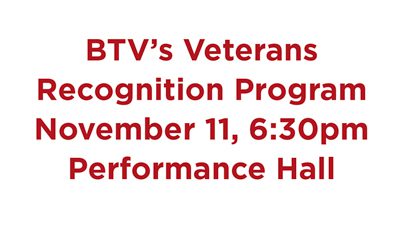 Butterfield Trail Village is committed to honoring its residents who served in the military, affording them the opportunity to share their stories and reflect on their experiences.
Butterfield Trail Village is committed to honoring its residents who served in the military, affording them the opportunity to share their stories and reflect on their experiences.
BTV Director of Programs and Events Riki Stamps and her team produce a veteran recognition program each year for residents. The program allows BTV veterans to share their military service experiences – and has offered the chance for some to receive long-due recognition. In 2015, for example, past resident Jim Buckner, a former Army lieutenant colonel honored for bravery in Vietnam some 50 years earlier, was honored at the BTV Veterans Appreciation Dinner with friends and family in attendance.
For the past 25 years, Stamps has also been interviewing residents about their military service and documenting some of the first person accounts. In 2000, she worked with the area Daughters of the American Revolution to record a number of the BTV veterans’ accounts of their time in the military, which are now part of the U.S. Library of Congress Veterans History Project.
“I became curious about these stories after I learned Butterfield was home to a Pearl Harbor survivor,” Stamps said. “As time went on, I started gathering these stories, some documented, some not, and with each conversation, I felt compelled to share. These stories have made an impact on my life, and I’ve become keenly aware of what it means to be an American and love your country.”
Stamps said that for many veterans, especially elderly ones, it’s important that society offers them the opportunities to share their personal accounts of past service.
“It means something to them, personally, and to their families,” Stamps said. “Veterans deserve to tell their stories so that all generations will know the sacrifices that were made for the precious freedoms we enjoy in our country.”
“These men and women are heroes, no matter what role they played,” she added. “They’re part of our nation’s history and that’s something that should be recognized and never forgotten.”
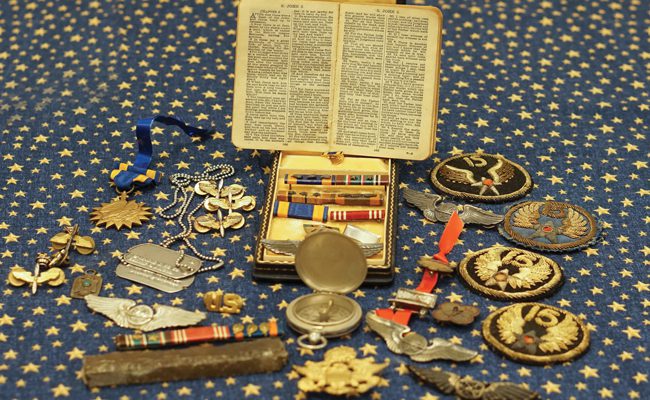
Medals, insignia and other U.S. military memorabilia belonging to BTV veteran Phil Wilson.
In recognizing Veterans Day this year, Butterfield is sharing stories of three residents who served during World War II. They are Navy 3rd Class John Robinson, Army Air Corps Cpl. Bill Stewart, and Army Air Corps Capt. Samuel Wilson. We wish to thank all our residents who are military veterans for their time, service and sacrifice.
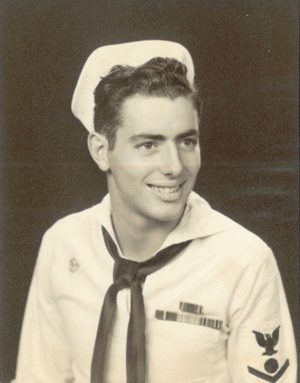
John Robinson
John Purviance Robinson, U.S. Navy
Electrician’s Mate Third Class
BTV resident John Robinson enlisted in the U.S. Navy at age 18, three years after the Dec. 7, 1941 bombing of Pearl Harbor. Robinson was a high school graduate from Madison County, where he played the flute and had a newspaper route.
When he enlisted, he followed in the footsteps of his father, Boyd Robinson, who served in the Army during World War I and was sent straight to France to fight in the trenches.
“I chose the navy because I couldn’t see myself in hand-to-hand combat,” Robinson said. “I was sworn in on the first day of April 1944, with the agreement that I could finish high school before being called to active duty. By the end of May or early June, I was active duty.”
After boot camp in San Diego, Robinson completed electrician’s school in St. Louis followed by naval submarine training in New London, Conn. Then, it was briefly back to California before his unit was dispatched to the Philippines to serve a year at a submarine base near Manila.
“We thought we would eventually be invading Japan, but it all came to an abrupt end when the atomic bomb was dropped in August 1945,” Robinson said.
After his discharge, Robinson attended college on a GI bill and graduated from John Brown University in Siloam Springs. He married his wife, Dorothy, and enjoyed a career as food services director at the University of Arkansas.
“I never realized my goal in the military to serve on a submarine, but I was pretty lucky that there were no big issues or stresses,” Robinson said. “Enlisting was the thing to do back then. You enlisted or you were drafted. But it was good training and good fellowship and a good experience.”
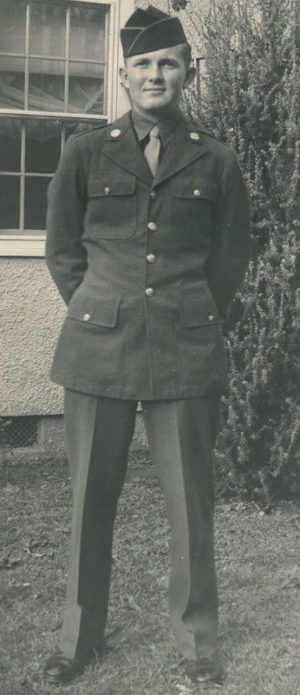
Bill Stewart
William ‘Bill’ Stewart, U.S. Army Air Corps
Aircraft Technician Fifth Grade
BTV resident Bill Stewart was 18 in 1944 when he volunteered for the Army Air Corps. The Air Corps was a branch of the Army that transitioned to the U.S. Air Force in 1947.
Stewart completed basic training at Sheppard Field, Texas, followed by aircraft engine training in Biloxi, Miss. In fall 1945, his troop shipped out across country to California, and departed for overseas.
“After basic training and airplane engine school, a group of guys took the train to Chicago,” Stewart said. “We flew to Truax Field in Madison, Wisc., and took the train to Oakland, Calif., where they put us on a corps carrier ship from WWI. We landed at Waikiki Beach for a couple of hours, but none of us had a clue where we were going. We wound up in Okinawa.”
Stewart was stationed in Okinawa, Japan with the 149th Aviation Engineering Battalion. A fellow corpsman George Freeman from Palestine, Texas took Stewart under his wing and showed him how to maintain a fleet of aircraft generators that Stewart was responsible for.
After his discharge in November 1946, Stewart hitchhiked from Seattle to Texas and finally home to Siloam Springs. In his uniform, toting his barracks bags, the young serviceman had no trouble getting rides from kind motorists. But the last leg of the trip took a nerve-wracking turn when an elderly gentleman he accepted a ride from fell asleep behind the wheel.
“He kept dozing off, but finally he let his grandson drive,” Stewart said. “We were about to Flint Creek in eastern Oklahoma when I saw the flashing red light of the (John Brown University) tower in the distance and knew I was home. I thought, ‘Man, that really looks good’.”
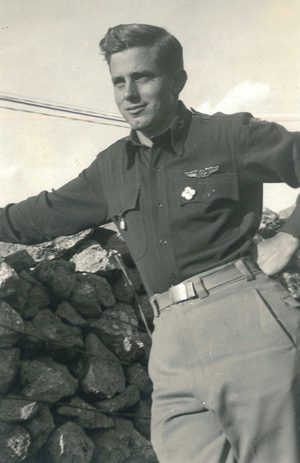
Phil Wilson
Capt. Samuel ‘Phil’ Wilson, U.S. Army Air Corps
B-17 Bomber Navigator
Retired Army Capt. Phil Wilson served with the 429th Squadron of the 2nd Bomb Group of the 15th Air Corps as a B-17 Bomber navigator in Europe at the height of World War II.
Raised in Nashville, Ark., Wilson enlisted in 1942 at age 18 and worked as a bank teller while awaiting his orders. After completing navigators flight school in San Marcos, Texas, he was stationed overseas in Foggia, Italy. There, his unit’s orders were to take out industrial sites in Munich, Germany, as well as oil fields in Romania, cutting off fuel supplies to Germany.
As a B-17 Bomber navigator, Wilson shared responsibility of his aircraft’s nose with the bombardier, tracking the plane’s location and where it was headed next.
After the Allied Forces invaded northern France in June 1944, a second invasion took place on the shores of southern France that August. Wilson’s group bombed those beaches of southern France just before the troops landed in Normandy.
By the time Wilson’s tour ended, he had flown 35 missions with 293 hours of flight time.
Later, he married his wife, Virginia, and enjoyed nearly a 40-year career as a manager at International Business Machines Corp. in Little Rock.
